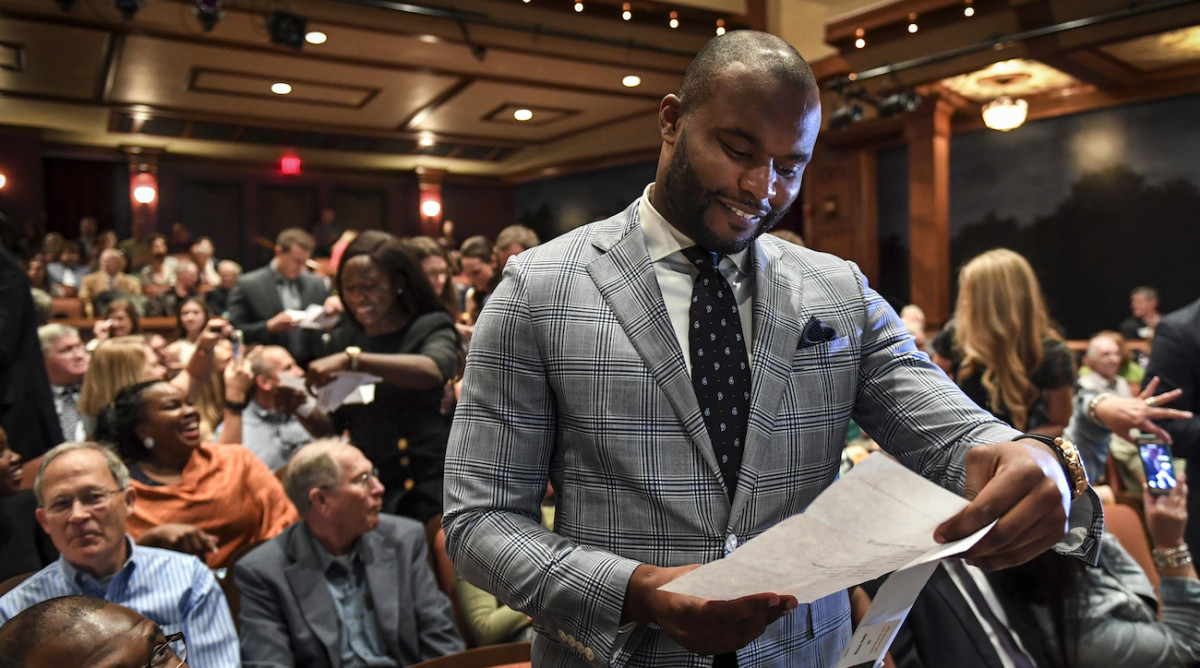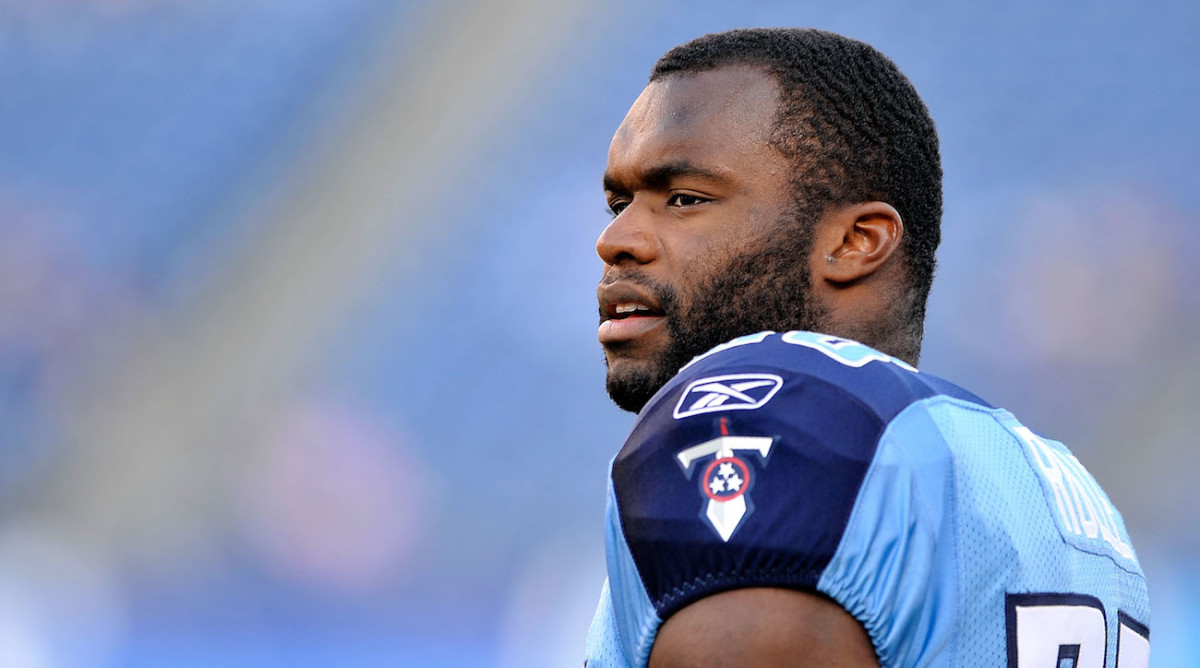Myron Rolle: From Football to Neurosurgery

He was in the NFL, he’s a surgeon, he studied in Europe, and he has his own foundation—he’s Myron Rolle! The former defensive back played at Florida State from 2006 through ’08 and was on pre-season squads for the Titans and Steelers. He last played in 2012, and now he is pursuing a career as a neurosurgeon. On top of that, Rolle is involved in two organizations that help kids succeed in life and become the leaders of tomorrow. I caught up with Rolle to talk about playing football at the highest level, earning a prestigious scholarship, and his new career path.
You are a neurosurgery resident. Could you explain for our young audience exactly what that means?
A residency is basically the time that is required to train in the position you want to pursue. For neurosurgery, a residency happens to be seven years.
What kinds of things will you do when you finish your residency?
I’m going to do a fellowship, which is another year of specific training for the type of neurosurgeon I want to be, which happens to be a pediatric neurosurgeon. Following that year, I can go and either do private practice or work in an academic institution, like here at Massachusetts General Hospital at Harvard.
How has playing football at such a high level helped you in your new career as a neurosurgeon?
Football has been a part of my life since I was six years old, and I thoroughly enjoyed it. It taught me teamwork, discipline, communication, how to prepare, and most importantly, [how to] overcome adversity. Sometimes days are tough, and you have results that you don’t expect, and that can get you really sad. But if you have the resolve to move forward and continue to try, work with other people, and get better, you can make it. I think that’s what my football training has taught me, and that’s what I’m bringing here.
You have mentioned that you would like to help two worlds—medicine and football—find common ground. What are your ideas on making football a safer sport?
Football is naturally a tough and violent sport, however I think that the more research we can do, and the more awareness we can bring to the players, coaches, and fans, the better and safer we can make it. I love the sport of football, and I want it to stay. The only way we can do that is if we work together to try to improve the science behind concussions and also educate everyone on the dangers of the sport. And not just football, either. That’s hockey, wrestling, cheerleading, soccer, and all the sports that involve contact and head injuries.

While you were at Florida State, you received a Rhodes Scholarship and studied at one of the most prestigious universities, Oxford, in England. What was the experience like, and how was it similar or different to Florida State?
Oxford was great! I was able to travel a whole lot and learned a lot too. I was able to be in a world where I was just a student and not an athlete. It was fun just being able to dive into all my studies. It made me a better thinker and learner. It was different from Florida State because down at Oxford, the way you think and the knowledge you have is very valued, whereas at Florida State, I was a football player and an athlete, so I had a different perspective. I had a different set of friends and a different set of circles than I had while I was at Florida State. However, they’re both great institutions, and I really enjoyed both experiences.
What’s the application process for applying to be a Rhodes Scholar?
It’s a tough process where you have to pass your institution’s test to be a Rhodes Scholar, first. Second, you are required to write a 1,000-word personal statement and submit the application, which talks about your interests, grade-point average (GPA), and includes letters of recommendation from five to six different people. The hardest part of the experience was that you have to do in-person interviews and then an interview with the Rhodes Scholar committee so they can see you, and talk to you, and find out why the Rhodes Scholarship is going to positively affect your life.
Did you always want to be a Rhodes Scholar?
I always wanted to be a Rhodes Scholar ever since I learned about Bill Bradley, a senator from New Jersey. I went to high school in New Jersey, and I heard about this guy; he was an All-American basketball player at Princeton, an NBA player, a U.S Senator, and he ran for President of the United States. He was phenomenal and also a Rhodes Scholar. So when I heard about his story, I said, When I get to college I‘m going to try it as well. I think when I was in high school I decided I wanted to be a Rhodes Scholar.
Aside from your work as a neurosurgeon, you are involved in a few organizations. One is the Emerging Scholars Project. What is the goal of that organization?
The Emerging Scholars Project is part of my foundation, the Myron L. Rolle Foundation. The Emerging Scholars program looks to increase the exposure for underrepresented populations. For me, being a black male, I’m a part of an underrepresented population, so we try to seek these people who may not have exposure to Rhodes, Marshall, or Truman scholarships and try to help prepare them for the next level.
Another organization you started is Our Way to Health. Who does that organization help?
Our Way to Health is also a part of the Myron L. Rolle Foundation. It is an anti-obesity program that helps Native Americans and helps them understand the importance of diet and nutrition while keeping their cultural identity relevant. Both the Emerging Scholars Project and Our Way to Health are great programs that deal with young populations who are going to be the future leaders of tomorrow, and we’re very proud of them!

What’s one thing you would tell young athletes about balancing sports and academics?
I would tell them that it’s possible, and it should be done because it helps you later in life to be well-rounded and to have the ability manage many different facets of the human experience. That means if you’re able to have the discipline to keep your sports and your academics going well and moving forward, you can transfer that discipline to any other aspect of your life. I think one helps the other; the better you are as an athlete, the more competitive you’ll be as a student, and the same way on the other end too. I would just encourage young people to continue to keep that good balance, work hard, and listen to your parents, and your coaches, and leaders because one day you’re going to be the leader making the decisions for the people who come behind you.
This interview has been edited for clarity and length.
Photographs by (from top): Joe Robbins/Getty Images; Toni L. Sandys/The Washington Post/Getty Images; Grant Halverson/Getty Images;
